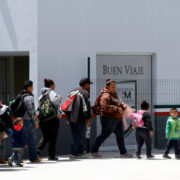Amid the crisis at the border after the began separating (and then reuniting) families at the border, President Donald Trump publicly advocated the denial of due process to undocumented immigrants crossing the border, thickening the plot in one of the most polarizing and convoluted political battles of this administration.
Instead of bolstering the backlogged immigration courts who must process the immigration processes of unauthorized asylum seekers, Trump advocates for immediate deportation of these individuals and families without granting them due process of law.
In a series of tweets, the president openly mocked the United States judicial system at a time when Washington lawmakers are grappling with bipartisan consensus on immigration legislation. To add to the complications, federal immigration agencies continue struggle to reunite the more than 2,000 migrant children with their parents after Trump reversed his administration’s policy that separated children from their parents at the border, as previously reported by the Asian Journal.
“Hiring many thousands [sic] of judges, and going through a long and complicated legal process, is not the way to go — will always be disfunctional [sic},” Trump tweeted on Monday, June 25. “People must simply be stopped at the Border and told they cannot come into the U.S. illegally. Children brought back to their country……….If this is done, illegal immigration will be stopped in it’s [sic] tracks – and at very little, by comparison, cost. This is the only real answer – and we must continue to BUILD THE WALL!”
The day before, he tweeted: “We cannot allow all of these people to invade our Country. When somebody comes in, we must immediately, with no Judges or Court Cases, bring them back from where they came. Our system is a mockery to good immigration policy and Law and Order.”
Due process, according to the Supreme Court, is a right for people to exercise legal rights and court processes guaranteed by American law. It allows individuals to challenge action proposed by the government in front of a judge or any neutral decision maker.
Access to due process has been a mainstay in the modern American judicial system and a fundamental rampart against tyranny. The concept was first introduced in the Constitution as a way to balance the power of law while protecting individuals from abuse of that power.
The Fifth Amendment provides that “No person shall…be deprived of life, liberty, or property, without due process of law.” The Fourteenth Amendment — which was adopted after the Civil War to grant citizenship rights and equal protection of the laws for former slaves — also has a Due Process Clause that reinstates the Fifth Amendment text.
Trump’s possible denial of the right of due process for unauthorized immigrants at the border would violate the Constitution, which allows due process for all individuals within the U.S. regardless of citizenship.
In the 2001 landmark Supreme Court case, Zadvydas v. David, the judges determined that “once an [immigrant] enters the country, the legal circumstance changes, for the Due Process Clause applies to all ‘persons’ within the United States, whether their presence is lawful, unlawful, temporary, or permanent.”
Courts have always found that anyone on U.S. soil is protected by this constitutional right, even if they illegally entered the country seeking asylum. They have also upheld that if an order for deportation was given to illegal border crossers, they have the right to challenge those decisions through civil proceedings in immigration courts and judges under the Justice Department.
This process can take months or, in some cases, years due to the intense backlog of immigration cases.
Even immigrants who are ordered for expedited removal can avoid it by seeking asylum; U.S. Citizenship and Immigration Services agents will then review the case to see if the applicant has a credible fear of persecution back home.
As previously reported by the Asian Journal, the Trump administration’s “zero tolerance policy” which immediately puts criminal charges on adult border crossers, even those seeking asylum — complicates this protocol. Asylum proceedings are a civil process, but now the government also separately pursues criminal prosecution in federal court. (Klarize Medenilla/AJ Press)






